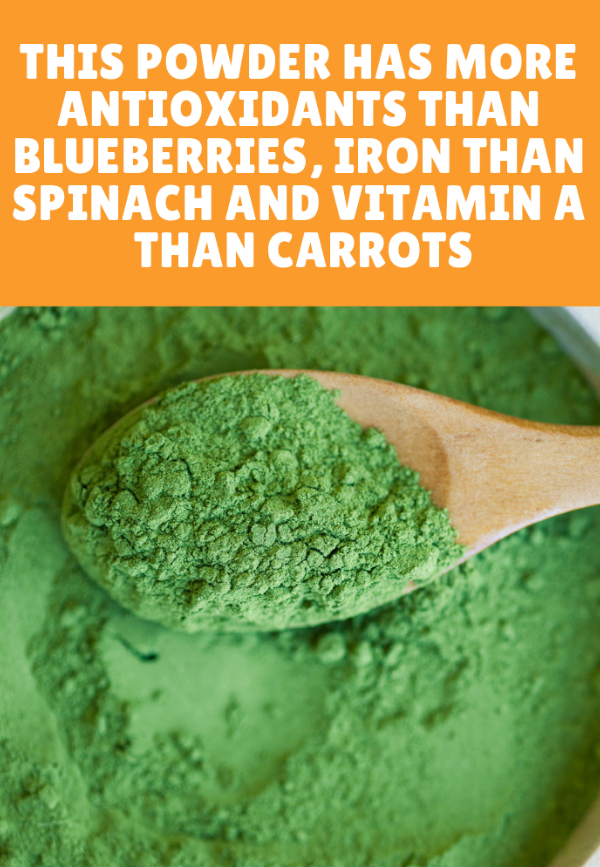The world first heard about spirulina few years ago. It was first thought to be the green miracle powder of the sea, and the secret weapon of Aztecs. Today we know that spirulina offers tons of protein for vegans and vegetarians. It’s also packed with important antioxidants, enzymes, vitamins, and minerals.
Moreover, it contains twice as much nutrients as 5 servings of fresh fruits and vegetables.
So, what makes spirulina this special?
It’s actually a cyanobacteria or a blue-green algae as experts explain. Spirulina got its name after its bright color. Most of its pigments are bioavailable and healthy, especially beta-carotene and chlorophyll-a.
So, what makes spirulina this special?
It’s actually a cyanobacteria or a blue-green algae as experts explain. Spirulina got its name after its bright color. Most of its pigments are bioavailable and healthy, especially beta-carotene and chlorophyll-a.
Algae produces oxygen through photosynthesis, which makes it pretty similar to land-dwelling plants. It’s also packed with many beneficial nutrients.
Please Click “Next”or “Open”To Read More
Where was the cyanobacteria first found?
Today, we can find it in everywhere, including oceans, fresh water, damp soil, moist rocks in deserts, bare rocks and soil, and even the rocks in Antarctica. Large percent of commercialized spirulina in our country is picked off the shores in Hawaii and South America.
It’s later sold in powder form, pills, and flakes. It comes pure or combined with other ingredients.
Benefits
Spirulina is almost 60% protein, and it’s an excellent alternative to meat proteins sources. Nutritionists say that it’s one of the very few plant sources of vitamin B-12.
As you may now, vegetarians lack this vitamin in their diet. Spirulina contains ALA, (omega-3), LA (omega-6), GLA (reduces inflammation), and DHA (main component of brain). These healthy lipids carry many important roles.
Today, we can find it in everywhere, including oceans, fresh water, damp soil, moist rocks in deserts, bare rocks and soil, and even the rocks in Antarctica. Large percent of commercialized spirulina in our country is picked off the shores in Hawaii and South America.
It’s later sold in powder form, pills, and flakes. It comes pure or combined with other ingredients.
Benefits
Spirulina is almost 60% protein, and it’s an excellent alternative to meat proteins sources. Nutritionists say that it’s one of the very few plant sources of vitamin B-12.
As you may now, vegetarians lack this vitamin in their diet. Spirulina contains ALA, (omega-3), LA (omega-6), GLA (reduces inflammation), and DHA (main component of brain). These healthy lipids carry many important roles.
Please Click “Next”or “Open”To Read More
Gram-per-gram spirulina contains:
3,100% more beta-carotene (vitamin A) than carrots
5,500% more iron than spinach
600% more protein than tofu
280% more antioxidants than blueberries
The blue-green algae contains vitamins B1 (thiamine), B2 (riboflavin), B3 (nicotinamine), B6 (pyridoxine), B9 (folic acid), C, D, and E.
It’s an excellent source of potassium, calcium, chromium, copper, magnesium, manganese, phosphorus, selenium, sodium, and zinc.
Extra benefits:
Relieves allergies
Boosts immunity
Regulates blood pressure
Normalizes cholesterol
Prevents cancer
Stimulates friendly bacteria in the intestines
Reduces the risk of cataracts and age-related macular degeneration
Provides strong anti-inflammatory and antimicrobial potential
Offers great antiviral activity against HIV, herpes, and hepatitis
Strengthens insulin resistance
Prevents liver damage caused by chemo drugs
3,100% more beta-carotene (vitamin A) than carrots
5,500% more iron than spinach
600% more protein than tofu
280% more antioxidants than blueberries
The blue-green algae contains vitamins B1 (thiamine), B2 (riboflavin), B3 (nicotinamine), B6 (pyridoxine), B9 (folic acid), C, D, and E.
It’s an excellent source of potassium, calcium, chromium, copper, magnesium, manganese, phosphorus, selenium, sodium, and zinc.
Extra benefits:
Relieves allergies
Boosts immunity
Regulates blood pressure
Normalizes cholesterol
Prevents cancer
Stimulates friendly bacteria in the intestines
Reduces the risk of cataracts and age-related macular degeneration
Provides strong anti-inflammatory and antimicrobial potential
Offers great antiviral activity against HIV, herpes, and hepatitis
Strengthens insulin resistance
Prevents liver damage caused by chemo drugs
Please Click “Next”or “Open”To Read More
The best way to use spirulina
You can just swallow the pill or add ¼-1 teaspoon of the powder isolate to your smoothie. Nutritionists suggest that you do small amounts at first, because its taste is a bit sweet, and some can’t really stand its taste. spirulina is also available as pre-flavored, packaged protein powder.
Here’s a nice trick to try:
Add a tablespoon of spirulina powder to a bag of popcorn, and toss. For maximum flavor, add garlic powder to taste, and toss again. Caution: Do not pick random algae from your local pond, because you can accidentally ingest non-edible species bring your health in danger.
You can just swallow the pill or add ¼-1 teaspoon of the powder isolate to your smoothie. Nutritionists suggest that you do small amounts at first, because its taste is a bit sweet, and some can’t really stand its taste. spirulina is also available as pre-flavored, packaged protein powder.
Here’s a nice trick to try:
Add a tablespoon of spirulina powder to a bag of popcorn, and toss. For maximum flavor, add garlic powder to taste, and toss again. Caution: Do not pick random algae from your local pond, because you can accidentally ingest non-edible species bring your health in danger.
